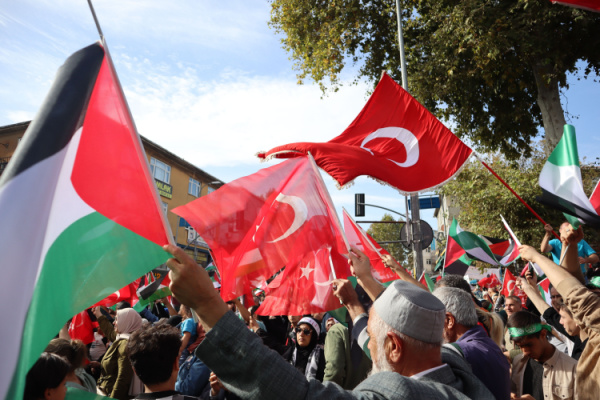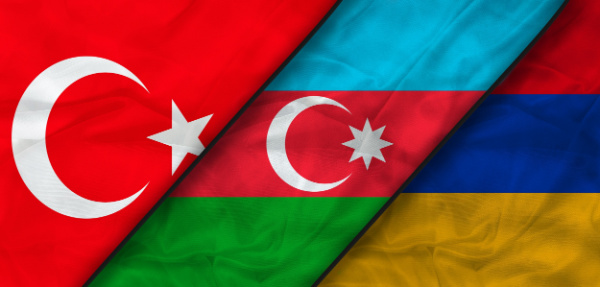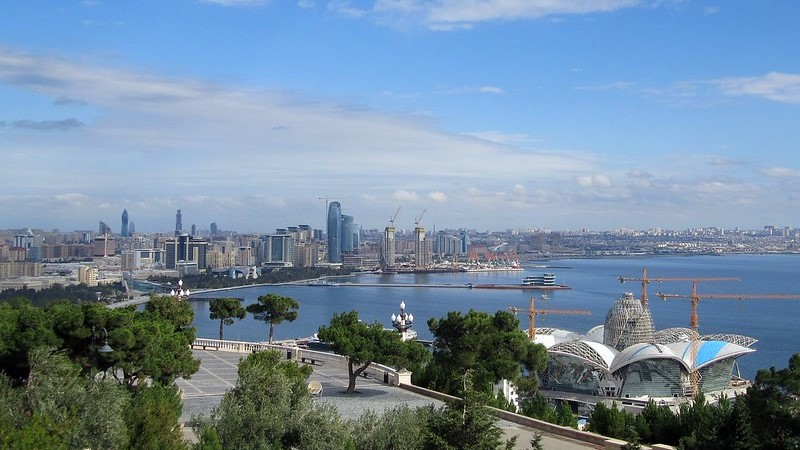With the TRIPP Turkey is Set to Benefit Most in the South Caucasus
By Emil Avdaliani
The US involvement in the South Caucasus means that Washington will become increasingly dependent on Turkey to ensure the long-term viability of the corridor through Armenia. The TRIPP not only invites direct American economic and business presence in the South Caucasus but also expands Turkey’s role in the region. The TRIPP agreement will advance Ankara’s commercial and political interests in the South Caucasus and sideline Iran and to a certain extent Russia. The agreement also opens the way for the restoration of ties between Ankara and Yerevan. But the slow progress of the ongoing Armenia-Turkey talks once again demonstrates that the key to normalization lies in a peace agreement between Armenia and Azerbaijan.

Credit: PICRYL
BACKGROUND: On August 8 in Washington D.C., Armenia and Azerbaijan reached a landmark arrangement. Armenian Prime Minister Nikol Pashinyan and Azerbaijani President Ilham Aliyev signed a Joint Declaration on Future Relations, pledging to “chart a bright future not bound by past conflict, consistent with the UN Charter.” The historic document stated that the two countries no longer regard each other as enemies. A core component of the Washington deal is the TRIPP, Trump Route for International Peace and Prosperity, which envisions a transit and trade corridor through Armenia’s southern territory to link Azerbaijan proper with the Nakhchivan enclave. The United States is granted a 99-year mandate to oversee the creation and operation of the transit corridor across Armenian territory.
For Turkey, the TRIPP offers an opportunity to diversify its commercial routes across the South Caucasus. Until now, Turkey enjoyed only one transit route to the Caspian Sea. The corridor through Georgia built in the 1990s, expanded in the 2000s and consisting of roads, railways and pipelines has been an important factor in strengthening Ankara’s relations with Tbilisi. The Georgia route has boomed since February 2022 when Russia invaded Ukraine and the north Eurasian route linking China with the EU became less secure. As a viable alternative, the Middle Corridor running from Turkey and Georgia to Central Asia has become more attractive for global transport companies and actors such as the EU and China.
Yet reliance on one route is fraught with risks. The fickle geopolitical situation in the South Caucasus calls for developing alternatives and the route through Armenia’s southern territory is attractive to Ankara and Baku. Indeed, right after the TRIPP announcement, the Turkish side unveiled the start of construction of the Kars-Iğdır-Aralyk-Dilucu railway line, which will become a key element of the corridor. The project’s cost is up to €2.4 billion and is set to serve as yet another link for China-EU trade. More importantly, it will connect Turkey with the Central Asian market and sideline its competitors in the South Caucasus – Russia and Iran.
IMPLICATIONS: The TRIPP lands Russia and Iran in an uncomfortable position. Iran’s concerns are based on the notion that any plan that might alter regional borders or limit Armenia’s sovereignty would by default weaken the Islamic Republic’s influence in the South Caucasus. Since 2020, when Azerbaijan recovered most of its lost territories, Tehran has actively resisted the projects advanced by Baku which would see the so-called Zangezur Corridor (in Armenia referred to as “corridor” or “Syunik corridor”) running through Armenia’s southernmost territory of Syunik. Iran considers the short border with Armenia as an only reliable land link into the South Caucasus, free of Turkish-Azerbaijani influence. The route to Armenia is also a corridor for Iran to access Georgia’s Black Sea ports and from there the European market.
The TRIPP also benefits Turkey since it strips Iran of a geopolitical leverage it has had over Azerbaijan, namely, the Aras corridor which connects Azerbaijan proper with its exclave of Nakhichevan via Iran’s northern territory. In 2023, Baku and Tehran reached an agreement to expand the infrastructure along the route which envisioned a transit flow of 15 million tons of cargo by the end of this decade. The corridor stretching for 107 km though is not seen by Iran as a mere transit of goods and passengers through its territory. In fact, Tehran perceives the route as an important instrument for retaining influence in the South Caucasus and for checking Turkey’s growing role.
Russia’s position in the South Caucasus meanwhile is changing. Russia is preoccupied with its war in Ukraine, remains heavily sanctioned by Western countries and the dialogue with the United States has not yielded any results; on the contrary, President Donald Trump now seeks to bring the war to an end by stepping up the military pressure on Russia. In this wider context, Moscow’s relations with Azerbaijan, Turkey’s key ally, are undergoing structural shifts which began in late 2024 when an Azerbaijani civilian plane was shot down by Russian air defense batteries over the North Caucasus. The incident however only served as a pretext, overshadowing the much deeper differences between Baku and Moscow. With the return of Nagorno-Karabakh, Azerbaijan has become more self-reliant in pursuing its foreign policy aims. Meanwhile, Russia’s relations with its major ally in the region, Armenia, are also changing.
Discontent with how Russia acted in 2020 and 2023 when Nagorno-Karabakh fell, Yerevan began to rapidly diversify its foreign policy by developing multiple strategic partnerships with actors ranging from the US to China. These two major developments elevate the role that the Turkey-Azerbaijan axis plays in the region and paved the way for the rapprochement between Ankara and Yerevan.
Given the fact that the TRIPP should facilitate the reaching of a Armenia-Azerbaijan peace deal, it will also, in turn, advance the ongoing rapprochement process between Yerevan and Ankara. Initiated in the aftermath of the second Nagorno-Karabakh War, the dialogue between Turkey and Armenia initially centered on the potential opening of the common border closed since 1990s when the first war over Nagorno-Karabakh raged and Ankara supported Baku. Eventually, the Armenian-Turkish rapprochement began to cover the restoration of diplomatic ties. The two sides held a series of meetings and the Armenian Prime Minister Nikol Pashinyan even went to Turkey on an official visit.
On September 12, a meeting between Armenia and Turkey's special representatives for the normalization of relations, Ruben Rubinyan and Serdar Kılıç, took place in Yerevan. The two sides reaffirmed their commitment to continuing the process of dialogue and cooperation, emphasizing its importance for the entire region. Yet, the meeting did not yield any major progress for Yerevan, as it seemed to have served to clarify the details of Armenia’s compliance with Baku and Ankara’s demands. Just prior to the meeting, the Armenian side announced it would drop featuring the Mount Ararat on the country’s border crossing stamps. This is not the first time that Armenia did so. In 2008, when a major normalization effort between Ankara and Yerevan was underway, the Armenian Football Federation briefly removed the depiction of the Mountain Ararat from its logo but the decision was swiftly rescinded.
The slow progress of the ongoing Armenia-Turkey talks once again shows that the key to normalization lies in a peace agreement between Armenia and Azerbaijan. Turkey, time and again, has also made it clear that the final resolution of the differences between the two sides was contingent upon Yerevan and Baku reaching a comprehensive peace agreement. This involves Armenia changing the preamble of its constitution with its reference to the Nagorno-Karabakh. Another precondition seemed to have been what Baku referred to as the Zangezur Corridor.
CONCLUSION: The US involvement in the South Caucasus means that Washington will become dependent on Turkey to ensure the long-term viability of the corridor through Armenia. The TRIPP not only invites direct American economic presence in the South Caucasus but also expands Turkey’s role in the region. The losers are Iran and Russia and in response a further alignment between Tehran and Moscow can be anticipated. Both Iran and Russia prefer north-south connectivity, while Turkey and the Western countries opt for the east-west direction of railways and pipelines.
Yet, in practice, Russia and Iran have fewer tools to reverse the development of the TRIPP. Neither Tehran nor Moscow can afford any deterioration of ties with Turkey or Armenia and Azerbaijan at the time when the Islamic Republic and Russia have other pressing geopolitical issues to attend to.
Emil Avdaliani is a research fellow at the Turan Research Center and a professor of international relations at the European University in Tbilisi, Georgia. His research focuses on the history of the Silk Roads and the interests of great powers in the Middle East and the Caucasus.
Can Turkey Both Stand Up to Israel and Do Business with It?
By Reuben Silverman
January 12, 2024
On the eve of Turkey’s centennial anniversary celebrations, President Recep Tayyip Erdoğan held a mass rally in support of Palestine. He reminded his audience that, only a century earlier, Gaza had been part of the Ottoman Empire. He condemned Israel’s government and criticized the West for remaining silent in the face of Israel’s retaliatory killing of civilians, wondering if it wanted to encourage conflict between “crescent and cross.” Yet, while this heated rhetoric positions Turkey as the ultimate opponent of Israeli expansionism and protector of Palestinians, it obscures on-going Turkish-Israeli relations and the strategic interests that may limit Erdoğan’s actual diplomatic options.

Peace with Armenia Will Further Pan-Turkic Ambitions
By Barçın Yinanç
November 9, 2023
A peace settlement in the Caucasus provides a huge window of opportunity for the realization of the Middle Corridor. Turkey needs to strike the right balance in its relations with Armenia and Azerbaijan while neutralizing the disruptive influence of Iran and Russia. Turkey, whose military backing has been decisive in Azerbaijan’s victories in Nagorno-Karabakh, needs to convince its close ally that it’s in their common interest that Armenia is rewarded for its policies, and that inaction could prove costly for regional peace and pan-Turkic ambitions.

The Middle Corridor Calls for Turkish-European Cooperation
By Barçın Yinanç
January 17, 2022
While it was fear of Russia that prevented the Central Asian countries from showing an interest in the Middle Corridor, it is ironically the same Russian factor that has today led to the reinvigoration of this alternative to the Northern Corridor. However, crucially, the future of the Middle Corridor depends on European interest and particularly on the European Union revising its attitude toward Turkey that has been spearheading the project for more than a decade and that is indispensable to its realization. European decision makers must recognize that they need to join hands with Turkey to make the Middle Corridor come to fruition.

The "Dostuk" Deal: Boosting Pan-Turkic Energy Cooperation
By Natalia Konarzewska
June 1, 2021
Turkey, Turkmenistan and Azerbaijan envision closer, trilateral economic cooperation. The recent, landmark agreement between Azerbaijan and Turkmenistan on the development of the Kepez/Serdar offshore field, renamed ''Dostluk'' or ''Dostlug” (“Friendship”), which ends a decades-long conflict between the two countries, promises to boost pan-Turkic energy cooperation. Also, Turkey’s new connectivity with Azerbaijan and the Caspian Basin after the Nagorno-Karabakh ceasefire agreement has the potential to reinvigorate Ankara's economic relations with the Turkic nations of Central Asia. Even though the current feasibility of new energy infrastructure projects is uncertain, the importance of the deepening relationship of Turkey, Azerbaijan and Turkmenistan is above all geopolitical, and its implications are not lost on Russia and Iran, which have already been alarmed. Ankara's pan-Turkic successes in the Caspian Basin and in Central Asia presage an intensified geopolitical competition in these regions.




